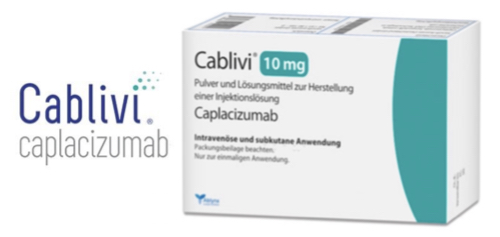Cablivi () vs Adzynma (ADAMTS13)
Cablivi () vs Adzynma (ADAMTS13)
Cablivi (caplacizumab) is a medication specifically designed to treat adults with acquired thrombotic thrombocytopenic purpura (aTTP), a rare blood clotting disorder, by blocking the activity of a protein that leads to blood clot formation. On the other hand, Adzynma is a brand name that seems to be a misspelling or confusion as there is no widely recognized medication by this name for treating aTTP or related conditions; it's possible that the intended reference is to ADAMTS13, which is an enzyme involved in blood clotting, and not a medication. Patients deciding on the right medicine for aTTP would consider Cablivi under the guidance of a hematologist, while ADAMTS13 levels are typically measured to diagnose or assess the severity of aTTP, rather than being a treatment option.
Difference between Cablivi and Adzynma
| Metric | Cablivi () | Adzynma (ADAMTS13) |
|---|---|---|
| Generic name | Caplacizumab | Not applicable (ADAMTS13 is an enzyme, not a drug) |
| Indications | Acquired thrombotic thrombocytopenic purpura (aTTP) | Investigational for thrombotic thrombocytopenic purpura (TTP) |
| Mechanism of action | Targets von Willebrand factor (vWF) to prevent the formation of microclots | Replaces deficient or defective ADAMTS13 enzyme in patients with TTP |
| Brand names | Cablivi | Not applicable (ADAMTS13 is not a marketed drug) |
| Administrative route | Subcutaneous injection | Intravenous infusion (as part of investigational therapy) |
| Side effects | Epistaxis, headache, gingival bleeding, etc. | Not well-defined (investigational status) |
| Contraindications | Hypersensitivity to caplacizumab or excipients | Not well-defined (investigational status) |
| Drug class | Anti-vWF Nanobody | Not applicable (enzyme replacement therapy) |
| Manufacturer | Sanofi | Not applicable (ADAMTS13 is not commercially manufactured as a drug) |
Efficacy
Efficacy of Cablivi (caplacizumab) in Acquired Thrombotic Thrombocytopenic Purpura (aTTP)
Cablivi (caplacizumab) is a nanobody that targets von Willebrand factor (vWF), a protein involved in blood clotting. It has been approved for use in the treatment of adults with acquired thrombotic thrombocytopenic purpura (aTTP), a rare blood disorder characterized by blood clot formation in small blood vessels throughout the body, leading to thrombocytopenia, microangiopathic hemolytic anemia, and organ damage. Clinical trials have demonstrated that Cablivi, when used in conjunction with plasma exchange and immunosuppression, significantly reduces the time to platelet count normalization, which is a crucial marker of treatment response in aTTP. This reduction in time to platelet count recovery is associated with a decrease in the occurrence of aTTP-related deaths, aTTP recurrence, and major thromboembolic events.
The HERCULES study, a phase III clinical trial, showed that patients treated with Cablivi experienced a 74% reduction in the composite endpoint of aTTP-related death, recurrence of aTTP, or at least one major thromboembolic event, compared to those receiving placebo. The study also found that more patients treated with Cablivi achieved remission and that Cablivi treatment resulted in a lower rate of aTTP recurrence during the study period. These findings underscore the efficacy of Cablivi in improving patient outcomes in aTTP.
Efficacy of Adzynma (recombinant ADAMTS13) in Acquired Thrombotic Thrombocytopenic Purpura (aTTP)
Adzynma is the trade name for recombinant ADAMTS13, an enzyme that is deficient in patients with congenital TTP and can be reduced in acquired TTP due to autoantibodies. While recombinant ADAMTS13 is not yet commercially available or approved for the treatment of aTTP, it has shown promise in early clinical studies. In acquired TTP, the presence of autoantibodies inhibits the activity of ADAMTS13, leading to the accumulation of ultra-large von Willebrand factor multimers and subsequent platelet aggregation and thrombosis. By supplementing with recombinant ADAMTS13, it is hypothesized that the pathological process can be counteracted, potentially reducing the severity and duration of the disease.
Current research on recombinant ADAMTS13 is focused on its potential to become a targeted therapy for aTTP. Although data from large-scale clinical trials are not yet available, early phase studies suggest that recombinant ADAMTS13 could be beneficial in restoring enzyme activity, reducing the need for plasma exchange, and improving patient outcomes. As research progresses, recombinant ADAMTS13 may offer a new therapeutic option for the management of aTTP, particularly for patients who are refractory to or have contraindications for plasma exchange therapy.
Regulatory Agency Approvals
Cablivi
-
European Medical Agency (EMA), European Union

-
Food and Drug Administration (FDA), USA

-
Health Canada

-
Therapeutic Goods Administration (TGA), Australia

Adzynma
-
Food and Drug Administration (FDA), USA

Access Cablivi or Adzynma today
If Cablivi or Adzynma are not approved or available in your country (e.g. due to supply issues), you can access them via Everyone.org.
How it works

Make an enquiry
Choose the medicine you want to buy, answer a couple of questions, and upload your prescription to speed things up. We’ll get back to you within 24 hours.


Make an enquiry
Choose the medicine you want to buy, answer a couple of questions, and upload your prescription to speed things up. We’ll get back to you within 24 hours.


Breeze through the paperwork
We'll guide you through the required documents for importing unapproved medicine, ensuring you have all the necessary information.


Get a personalized quote
We’ll prepare a quote for you, including medicine costs and any shipping, administrative, or import fees that may apply.


Receive your medicine
Accept the quote and we’ll handle the rest - sourcing and safely delivering your medicine.

Some text on this page has been automatically generated. Speak to your physician before you start a new treatment or medication.
Let's talk
If you have any questions, call us or send us a message through WhatsApp or email:
Contact us




